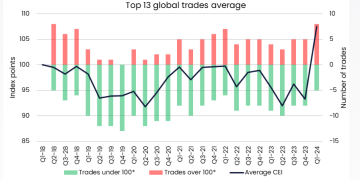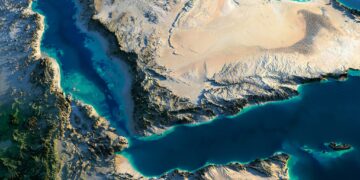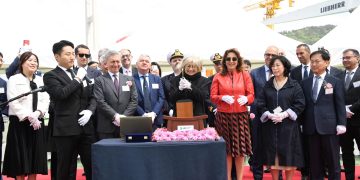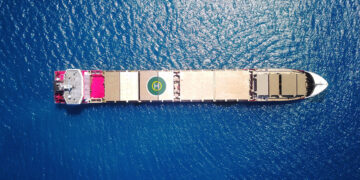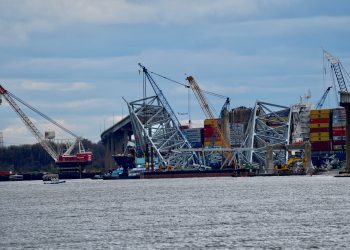Two-year criminal investigation into the spill using BP’s internal flow-rate models
 On April 25, 2010, three days after the Deepwater Horizon rig sank in the Gulf of Mexico, Doug Suttles, a senior BP executive, told reporters the company’s deep-sea well was leaking about 1,000 barrels of oil a day, a fraction of its maximum output.
On April 25, 2010, three days after the Deepwater Horizon rig sank in the Gulf of Mexico, Doug Suttles, a senior BP executive, told reporters the company’s deep-sea well was leaking about 1,000 barrels of oil a day, a fraction of its maximum output.
“This is a long way away from something more significant,” Suttles said.
Yet as Suttles and other BP executives assured the nation that the leak was small, the oil company’s engineers had developed internal models showing a probable flow that was magnitudes greater, setting the stage for an unparalleled disaster, according to a newly unsealed federal affidavit and internal BP documents.
BP’s internal flow-rate models — and growing evidence that BP employees may have deliberately withheld from federal officials the damaging information found in them — have emerged as a major focus of the Justice Department’s two-year criminal investigation into the spill, according to legal experts and attorneys involved in litigation over the disaster.
Documents obtained by The Huffington Post also indicate that Kurt Mix, a senior BP engineer charged April 24 with obstruction of justice, shared information with more senior BP executives during the spill, including a senior vice president, Jonathan Sprague, who formerly managed BP’s Gulf of Mexico operations.
Legal experts said criminal convictions for covering up the size of the spill could land senior BP personnel behind bars and swell the company’s civil liability by billions of dollars.
Scott Dean, a BP spokesman, said the company was cooperating with the federal probe, but he declined to comment on the documents obtained by the HuffPost, or on the possibility that others at the firm may be indicted. Mix’s attorney said in a statement the charges against her client are meritless. Michael Monico, a Chicago criminal defense lawyer representing Sprague, said his client would not comment on the charges against Mix. BP would not comment on Sprague’s role as Mix’s supervisor.
Federal investigators’ focus on the well’s flow rate was made clear with the Mix arrest — the first and only time that criminal charges have been filed in the Deepwater Horizon disaster, which killed 11 rig crew members. Authorities charged Mix with obstruction of justice for destroying text messages discussing far higher flow estimates than BP revealed publicly at the time.
More arrests tied to the spill estimates are highly likely, legal experts and a corporate insider said.
“I’d be shocked if there weren’t more arrests and charges, against people significantly higher up the food chain than Mix,” said Dan Cogdell, a Houston criminal defense attorney specializing in white collar and environmental cases. It was “completely transparent” that prosecutors plan further arrests related to the flow rate, Cogdell said.
Lawyers for one of BP’s corporate partners on the Macondo well also have concluded that more individuals at the British oil giant may be indicted for covering up the true extent of the spill, according to a senior consultant for the firm, who requested anonymity due to the sensitivity of the investigation.
Prosecutors may be targeting BP executives for withholding information about the company’s internal flow-rate models with the government, said the consultant, who has discussed the matter with attorneys directly involved with civil and criminal litigation over the spill. .
“Other BP people are going to be indicted,” he said. “They’re going after them on the flow rate.”
“They’re going to try to get some of the big boys,” he added.
In a statement on its website, BP said it would not discuss the charges against Mix, but said the company “will continue cooperating in the Department of Justice’s investigation.”
Mix faces up to 20 years in prison if convicted, and prosecutors will likely use the possibility of a heavy sentence as a bargaining chip to coerce him to testify against higher-ups at the company.
“It’s typical — getting somebody under indictment that they might be able to crack, and then moving up the ladder,” said Dick DeGuerin, a prominent Houston criminal defense attorney.
In a statement, Mix’s attorney, Joan McPhee, described the charges as misguided. “We have every confidence that Kurt will be exonerated at trial,” she said.
An engineer who worked with Mix on efforts to seal the well said he was shocked to hear of the arrest. “He’s not in the hierarchy at all,” said the engineer, who requested anonymity due to the ongoing investigation. “I would be extremely surprised if he was trying to cover something up.”
But the engineer also said that the flow rate figures publicly endorsed by BP executives lacked credibility among those working to cap the well. The gap between the company’s figures and reality became particularly obvious after live video of the leaking pipe began to be broadcast on the Internet and on national television, he said.
BP’s public estimates ranged from 1,000 barrels to 5,000 barrels per day through the first six weeks of the spill. A government-organized scientific team ultimately estimated that the flow averaged more than 50,000 barrels per day throughout the three-month spill.
“You could look at the video that was on the news every night and know that it’s not 5,000 barrels a day,” the engineer said. “My granddaughter probably could have figured that out.”
Company emails and organizational charts for the oil spill response obtained by The Huffington Post outline BP’s chain of command leading from Mix and upward through the corporate hierarchy.
During the spill, Mix reported to Jonathan Sprague, identified in federal court documents as a BP vice president for global wells organization and a former manager of the company’s extensive Gulf of Mexico operations, according to the organizational charts. An April 25, 2010, email shows that Mix shared with Sprague flow-rate calculations, including potential flow volumes from the well that were far higher than the company’s public estimates.
Sprague’s involvement in the flow-rate estimates is further confirmed by an email exchange the New Orleans Times-Picayune obtained and first reported in January. That exchange took place on the day that the Deepwater Horizon, engulfed in flames, sank to the bottom of the Gulf of Mexico.
Those emails involved Rob Marshall, manager of BP’s sub-sea operations in the Gulf of Mexico, Gary Imm, a deepwater project manager, and Sprague. BP produced the emails as part of the civil litigation over the spill.
In the emails, dated April 22, 2010, Marshall notified Imm and Sprague that Alistair Johnston, an expert retained by BP, had created a model estimating that the Macondo well may be leaking 82,000 barrels per day.
In his response to Sprague and Marshall, Imm told them to keep the numbers under wraps. “Please tell Alistair not to communicate to anyone on this,” Imm wrote.
Imm added that “a number of people have been looking at” the flow-rate estimates, and that company officials had already had “difficult discussions” with the Coast Guard about the figures.
Other BP experts also generated flow-rate estimates far higher than the company’s official figures at the time, documents show. On April 24, 2010, Mix estimated that the flow from the well was from 8,600 to 69,500 barrels per day, according to a federal affidavit. The next day, Doug Suttles, the BP executive, publicly endorsed the estimate of 1,000 barrels per day.
BP has never disclosed the methodology behind the 1,000-barrel-per-day estimate. Rear Adm. Mary Landry, the Coast Guard official who led the initial federal response to the spill, said it was provided to her by Suttles.
“It would have been Doug Suttles,” Landry said in an interview with The Huffington Post last June. “Somebody was giving Doug numbers.”
During the initial weeks of the spill, Suttles, leading BP’s response, was the company’s chief liaison with the federal government. Suttles left BP, where he was chief operating officer for exploration and production, last year.
Reached by cell phone this week, Landry declined to discuss the Justice Department investigation. An attorney for Suttles did not respond to a request for comment.
According to DeGuerin, the defense attorney, government prosecutors do not need to show that BP officials lied to the federal government about the extent of the spill to win a criminal conviction. Any attempt to conceal the truth could result in a guilty verdict, he said.
“A dodge, an evasion, a coloring of the facts, is as bad as an outright lie,” DeGuerin said. “If it’s not accurate, it’s not accurate.”
BP faced stiff fines tied to the size of the Macondo spill. Federal environmental statutes mandate fines of up to $1,000 for every barrel of oil spilled into public waters. Over the 91 days the well spewed crude oil into the Gulf, the difference between 1,000 barrels per day and more than 50,000 barrels per day spirals into the billions of dollars.
But if federal prosecutors are able to prove in court that BP officials covered up the magnitude of the spill, criminal convictions would likely cost the company even more in civil penalties. Under federal law, if a company is demonstrated to have engaged in “willful misconduct” in relation to an oil spill, the penalties can more than quadruple, to $4,300 per barrel.
“A failure to report the extent of the flow rate — that would be a slam-dunk on willful misconduct, I think,” said Jamison Colburn, an environmental law professor at Penn State University and former enforcement litigator for the EPA.
Source: Huffington Post




